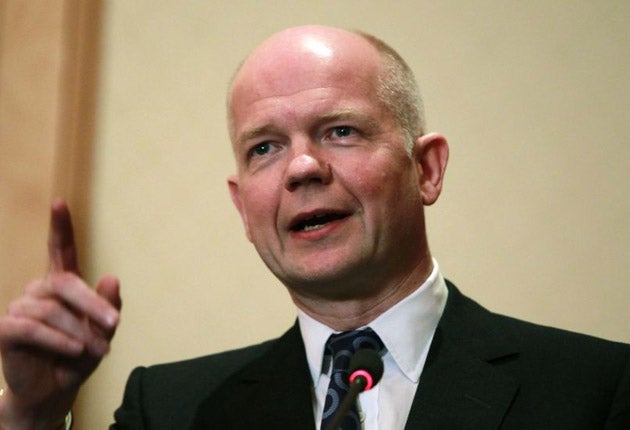Hague warns Israel to soften rhetoric

Your support helps us to tell the story
From reproductive rights to climate change to Big Tech, The Independent is on the ground when the story is developing. Whether it's investigating the financials of Elon Musk's pro-Trump PAC or producing our latest documentary, 'The A Word', which shines a light on the American women fighting for reproductive rights, we know how important it is to parse out the facts from the messaging.
At such a critical moment in US history, we need reporters on the ground. Your donation allows us to keep sending journalists to speak to both sides of the story.
The Independent is trusted by Americans across the entire political spectrum. And unlike many other quality news outlets, we choose not to lock Americans out of our reporting and analysis with paywalls. We believe quality journalism should be available to everyone, paid for by those who can afford it.
Your support makes all the difference.The Middle East peace process is in danger of falling victim to the revolutionary tide sweeping the Arab world, foreign secretary William Hague has warned.
Speaking on an emergency tour of the region, Mr Hague also urged Israel to tone down its "belligerent" language in the wake of the uprisings which have spread from Tunisia to Egypt and beyond.
The intervention came as the situation in Egypt intensified, with thousands of protesters again on the streets of Cairo demanding President Hosni Mubarak's immediate departure.
In an interview with The Times en route to Jordan, Mr Hague said: "Amidst the opportunity for countries like Tunisia and Egypt, there is a legitimate fear that the Middle East peace process will lose further momentum and be put to one side, and will be a casualty of uncertainty in the region."
He added: "Part of the fear is that uncertainty and change will complicate the process still further. That means there is a real urgency for the Israelis and the United States.
"Recent events mean this is an even more urgent priority and that's a case we are putting to the Israeli Government and in Washington."
Mr Hague responded to pronouncements by Israeli premier Benjamin Netanyahu, who has been urging his nation to prepare for "any outcome" and vowing to "reinforce the might of the state of Israel".
"This should not be a time for belligerent language," the Foreign Secretary said. "It's a time to inject greater urgency into the Middle East peace process."
Despite two weeks of steadfast pressure, Egyptian protesters have not achieved their goal of ousting Mr Mubarak.
Yesterday, thousands of civilians - including about 5,000 university professors and teachers - packed Cairo's Tahrir Square to continue their demonstrations calling for the president's removal.
In Alexandria, the country's second largest city, 18,000 people crammed into the main square, while some 3,000 service workers for the Suez Canal also demonstrated in Suez city.
Around 8,000 people also chanted anti Mubarak slogans in the southern city of Assuit.
The beleaguered president has refused to step down, insisting on serving until elections in September.
His regime offered more concessions to the protesters in hopes of appeasing them while keeping as firm a grip on power as it possibly can.
Vice president Omar Suleiman, who is managing the crisis, offered to set up committees to propose long-sought constitutional amendments and monitor the implementation of all proposed reforms.
Mr Mubarak also ordered a probe into last week's clashes between the protesters and government supporters as well as mass detentions of human rights activists and journalists.
Join our commenting forum
Join thought-provoking conversations, follow other Independent readers and see their replies
Comments